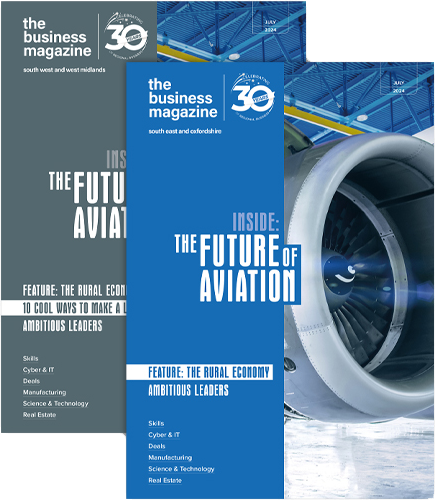Farnborough Airshow: £100m for green air travel

Westminster has announced more than £100 million of government-industry funding for tech projects to support greener air travel.
It comes as the latest figures from the aerospace industry’s trade body ADS show the sector contributed £38 billion to the UK economy in 2023.
Read our eight page feature on Aviation in the July issue of The Business Magazine...
The Business Magazine South East
The Business Magazine South West and West Midlands
Just under £103 million of funding in total, delivered through the Aerospace Technology Institute (ATI) Programme, has been announced for five aerospace R&D projects led by GKN Aerospace, Queens University, Rolls-Royce, Short Brothers and Gloucestershire-based ZeroAvia.
The projects will help pioneer innovations such as zero emission hydrogen-powered flight, new sustainable propulsion systems and turbine technologies, boosting thousands of high-skilled aerospace jobs across the UK and encouraging investment into the UK’s aerospace industry, as the Government prepares to launch its new Industrial Strategy.
Business and Trade Secretary Jonathan Reynolds said: "Our world-class aerospace sector added almost £40 billion to the economy last year, and by backing it to pioneer new technologies we’re delivering economic growth and supporting high-skilled jobs in every part of the UK.
"It’s fitting that I’m launching this new support at Farnborough Airshow, where the best of British innovation is showcased on the global stage, reinforcing our commitment to placing innovation and manufacturing at the heart of our Industrial Strategy."
Aerospace Technology Institute CEO Gary Elliott said: "The ATI Programme is continuing to target investment in world-class research projects that will deliver benefit for UK aerospace: accelerating technology development, growing our manufacturing capability, strengthening our supply chain and ensuring that the sector continues to generate economic return to the UK.
"The projects announced today focus on advanced technologies that take us a significant step closer to sustainable aviation, from new lightweight materials to new fuel systems. We look forward to building on this investment in support of an ambitious Industrial Strategy."
The five projects are
- The Hot Section Lifting and Materials (HOTLINE) project – led by Rolls Royce, with project partners Cranfield University and the University of Birmingham will develop turbine technologies that reduce unit and life cycle costs. Total Project cost of £20.5 million.
- Advanced Fuel Cell for Aviation Decarbonisation (AFCAD) – builds on ZeroAvia’s success with the Hyflyer I and II projects, to take the high temperature (HTPEM) fuel cell stacks technology to commercialisation stage, enabling zero emission hydrogen flight, with applications for rotorcraft and eVTOL. Total project cost of £17.5 million.
- Scenic Composites - By developing a variety of high value testing and manufacturing equipment at the Advanced manufacturing Innovation Centre (AMIC), this project led by Queens University Belfast will build capability in the aerospace cluster in the Belfast region around composite materials. Total project cost of £10.9 million.
- IVI - Short Brothers are leading this project with a key objective of reducing material usage, increasing fuel efficiency for a range of aircraft platforms, and enabling transition to new sustainable propulsion technologies. Government is awarding grant funding of £5.8 million. Total project cost of £10 million.
- H2FlyGHT – led by GKN Aerospace and a UK-based consortium of major aerospace suppliers and academic partners, including Parker-Meggitt Aerospace and the universities of Nottingham and Manchester aims to develop and test a fully integrated liquid hydrogen fuel system and 2 megawatt cryogenic electrical propulsion system for the next generation of zero emission aircraft. Total project cost of £44 million.



















